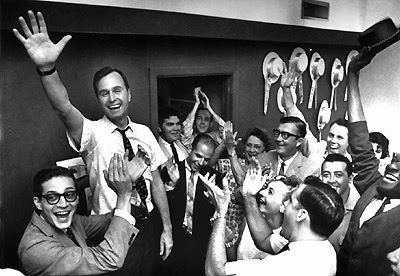Discussion
 |
| Hart under siege, May 1987 |
There are the stories no one would suspect. Everybody knew Gary Hart was getting laid, just like everybody knew Kitty Dukakis was having an affair with a Massachusetts State Trooper. That's why she was never around the governor. Only she wasn't. Kitty was battling a near-lifelong pill addiction when the 1988 campaign was getting underway. Michael (soon to be the "Mike" of campaign commercials) wasn't sure she could handle the public scrutiny, but she insisted. She went to Minnesota to get clean, and in her absence a rumor took hold about her security detail indiscretion. Everybody knew, of course, except those who knew.
George Bush embarked on the noble adventure: public service, just like his father Prescott did. Only the Yankee son refused to play to type. Running in Dixie, first he is forced to put a muzzle on his dad, a member of the Republican Eastern Establishment worked up over Goldwater. It seemed every Republican was worked up in 1964: the Goldwater conservatives about the Country Club set, and the Country Club set worked up about the Goldwater conservatives. Bush tried to keep the peace in the party, unexpectedly adding some West Texas sensibilities to his Eastern image. He did a decent job, ticking off some along the way, like when he was chided for not knowing "the difference between a common man and a common common man." But in his 1964 Senate loss, he received more votes than any Republican had in Texas state history. Oh, and the teenaged George W. Bush cries at his father's loss.
Gary Hart captured all the drama of this section. The story of his Bimini jaunt with a young woman, and a private Saturday night party that just happened to have Miami Herald reporters outside, there on a tip. Hart filled with rage, indignation. He was ready to quit almost from the outset -- the process wasn't dignified.
 |
| Hart staffers Joe Trippi and Kevin Sweeney |
It was when answering the question, "Have you ever committed adultery?" became a qualification for the presidency.
Word of the Week
The Lime-Green Pants Crowd - proper noun
George Bush, 1964 Republican nominee for U.S. Senate
a privileged member of the Republican Party from old money and/or Eastern elite institutions (i.e. Yale or the Council on Foreign Relations). See also: Country Club Republican
Share more quotes and scenes in the comments.













